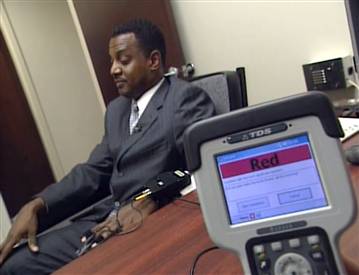Science Fiction
Dictionary
A B C D E F G H I J K L M N O P Q R S T U V W X Y Z
PCASS And The Original Handheld Lie Detector

The Preliminary Credibility Assessment Screening System (PCASS) is a handheld lie detector to be given to US Army soldiers in Afghanistan this month.

( Preliminary Credibility Assessment Screening System (PCASS) )
The defense department admits that the device is not perfect, but insists that it can help save American lives by screening local police officers, interpreters and allied forces for access to U.S. military bases, and by helping narrow the list of suspects after a roadside bombing.
However, the National Academy of Sciences has this to say about lie detectors:
"Almost a century of research in scientific psychology and physiology provides little basis for the expectation that a polygraph test could have extremely high accuracy... The inherent ambiguity of the physiological measures used in the polygraph suggest that further investments in improving polygraph technique and interpretation will bring only modest improvements in accuracy."
When asked specifically about the PCASS device, the lead author of the study, statistics professor Stephen E. Fienberg, stated:
"I don't understand how anybody could think that this is ready for deployment. Sending these instruments into the field in Iraq and Afghanistan without serious scientific assessment, and for use by untrained personnel, is a mockery of what we advocated in our report."
The first work on the idea of a lie detector was done by William Moulton Marston during WWI; he worked on a systolic blood-pressure test that could be used to detect deception.
He also created an illustrated version of a special handheld lie detector in a well-known fictional work; see a brief video of this device in action.
(The original handheld lie detector)
The Lasso of Truth (also called the Magic Lasso or Golden Lasso) forces a captured person to tell the truth in the Wonder Woman comic series.
Via New anti-terror weapon: Hand-held lie detector.
Scroll down for more stories in the same category. (Story submitted 4/12/2008)
Follow this kind of news @Technovelgy.| Email | RSS | Blog It | Stumble | del.icio.us | Digg | Reddit |
Would
you like to contribute a story tip?
It's easy:
Get the URL of the story, and the related sf author, and add
it here.
Comment/Join discussion ( 1 )
Related News Stories - (" Security ")
Flimmer Navy Drone Flies And Swims
Launch the Flying Sub!
Indian Court Says Brain Scan Proves Murder
Using a test called Brain Electrical Oscillations Signature, an Indian court convicts a woman based on her brain contents.
Background Draw-a-Secret (BDAS) Makes Graphical Passwords
Interesting security technique that takes advantage of the greater ease with which we all recall pictures, as opposed to the kind of alphanumeric strings IT techs want us to use for passwords.
ID-U Biometrics Eye Tracking Signature
Interesting new method of secure identification gathers a unique response to stimulus each time; old data cannot be copied and presented to the system.
Technovelgy (that's tech-novel-gee!) is devoted to the creative science inventions and ideas of sf authors. Look for the Invention Category that interests you, the Glossary, the Invention Timeline, or see what's New.
Science Fiction
Timeline
1600-1899
1900-1939
1940's 1950's
1960's 1970's
1980's 1990's
2000's 2010's
Current News
The New Habitable Zones Include Asimov's Ribbon Worlds
'...there's a narrow belt where the climate is moderate.'
Can One Robot Do Many Tasks?
'... with the Master-operator all you have to do is push one! A remarkable achievement!'
Atlas Robot Makes Uncomfortable Movements
'Not like me. A T-1000, advanced prototype. A mimetic poly-alloy. Liquid metal.'
Boring Company Drills Asimov's Single Vehicle Tunnels
'It was riddled with holes that were the mouths of tunnels.'
Humanoid Robots Tickle The Ivories
'The massive feet working the pedals, arms and hands flashing and glinting...'
A Remarkable Coincidence
'There is a philosophical problem of some difficulty here...'
Cortex 1 - Today A Warehouse, Tomorrow A Calculator Planet
'There were cubic miles of it, and it glistened like a silvery Christmas tree...'
Perching Ambush Drones
'On the chest of drawers something was perched.'
Leader-Follower Autonomous Vehicle Technology
'Jason had been guiding the caravan of cars as usual...'
Golf Ball Test Robot Wears Them Out
"The robot solemnly hit a ball against the wall, picked it up and teed it, hit it again, over and again...'
Boring Company Vegas Loop Like Asimov Said
'There was a wall ahead... It was riddled with holes that were the mouths of tunnels.'
Rigid Metallic Clothing From Science Fiction To You
'...support the interior human structure against Jupiterís pull.'
Is The Seattle Ultrasonics C-200 A Heinlein Vibroblade?
'It ain't a vibroblade. It's steel. Messy.'
Roborock Saros Z70 Is A Robot Vacuum With An Arm
'Anything larger than a BB shot it picked up and placed in a tray...'
A Beautiful Visualization Of Compact Food
'The German chemists have discovered how to supply the needed elements in compact, undiluted form...'
Bone-Building Drug Evenity Approved
'Compounds devised by the biochemists for the rapid building of bone...'
